1
2
3
4
5
6
7
8
9
10
11
12
13
14
15
16
17
18
19
20
21
22
23
24
25
DTE 82

Original releasedate: 12 July 1980

Original releasedate: 12 July 1980
This is a rough'n'ready translation of the magazine which was original in the Dutch language.
Besides this is only a summary as only the most interesting parts are translated.
Besides this is only a summary as only the most interesting parts are translated.
PART 2 (Double issue Over The Rainbow en zo 3 & 4)
|
RAINBOW OVER ROTTERDAM 2-2-80 On the moment the people in the band are still asleep, we drive with a sleepy feel into Rotterdam. We have a short kip in the car, have breakfast and go in the afternoon to the Ahoy Hall. We have forgotten to make a photocopy of the Sounds interview, but as a friend offers her original copy which we can give to Ritchie it looks like nothing can go wrong. That night after waiting (too) long it's again KATCHIS (not Catchese, like I wrote in the Brussels review), they play the same set as the night before. In the pause they play the same tape. And that's the story for many things. So I won't start all over again about this show. Rainbow is doing the same songs as the night before. The sound is not as good as in Brussels. That's not a fault of the group, it's the hall which has a poor acoustic sound. Graham tries to get everyone along during "All night long", but it's a tougher job than last night. The classical snippets Ritchie does sounds also excellent again. Don Airey's solo is a lot longer than yesterday. With the riff of "Smoke on the water" he gets everybody awake. 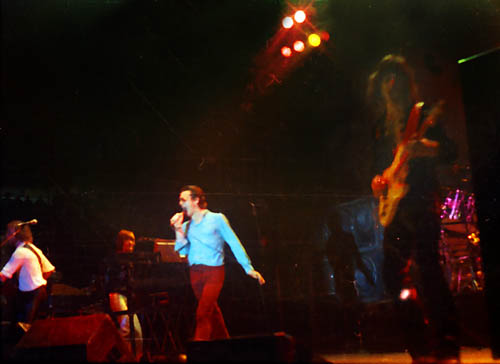 After "Lost in Hollywood" it's getting a bit weird. Right away we can hear the tape and Judy Garland start singing "Somewhere over the rainbow" and it looks like we won't get an encore tonight. I have to think back to the concert of Deep Purple in 1973 in Amsterdam, when the group also did not return for an encore and the audience smashed all the equipment on stage and left Purple with a huge loss-making item. But the Ahoy audience don't give up. It looks like ages but then Rainbow return on stage and start doing the encores.
After "Lost in Hollywood" it's getting a bit weird. Right away we can hear the tape and Judy Garland start singing "Somewhere over the rainbow" and it looks like we won't get an encore tonight. I have to think back to the concert of Deep Purple in 1973 in Amsterdam, when the group also did not return for an encore and the audience smashed all the equipment on stage and left Purple with a huge loss-making item. But the Ahoy audience don't give up. It looks like ages but then Rainbow return on stage and start doing the encores.Just like in Brussels they start with "Man On The Silver Mountain", followed by "Blues". When Graham than, like in Brussels, is going to start with "Will you love me tomorrow" (he sings the first few lines) he discovers the band has left the stage!?!?! Who's kiddin' who? All of a sudden Ritchie return to the stage, this time with a brandless guitar, which means the demolition act. Ritchie climbs the PA and hangs the demolished guitar in the spotlights. They play "Long Live rock and roll" and then it's over. The destroyed guitar hanging high in the air in the white spotlight. And then there's still one more unexpected thing. We hear a tape with a brilliant instrumental track, the guitar sound is obvious. Not that many people notice this piece of music as they try get to leave the hall. I keep listening. It's a great song and I'm sure this must be "Weiss Him" Roger mentioned last night. Then it's time to get to the Hilton hotel. In the Hilton Rotterdam it's a lot busier than last night in Brussels. We see people from Polydor (hi Ton and Ellen), Cozy, Roger and Don are present, we see Kees Baars (Oor Magazine and Veronica TV) and Kees Tabak (photographer Oor) and a few more people. We first join Roger and Kees Baars. Roger recognize us right away from the night before. He satisfied with the show tonight. I: Roger, "Down to earth" is a real Rainbow-record, still it's much more well-groomed than it's predecessor "Long live rock'n'roll"? 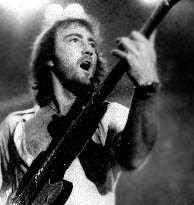 R: It was my aim, when I produced the album, to have a change to get airplay on American radio. That's very important, especially in the States. This record got quite some airplay in the States and we also sold pretty well. It's a special way of producing, especially used in the States. That's also why it was for Rainbow that important to have a hit. I think we did quite well with "Since you been gone". This was the single we were lookin' for.
R: It was my aim, when I produced the album, to have a change to get airplay on American radio. That's very important, especially in the States. This record got quite some airplay in the States and we also sold pretty well. It's a special way of producing, especially used in the States. That's also why it was for Rainbow that important to have a hit. I think we did quite well with "Since you been gone". This was the single we were lookin' for.I: Don't you think Ritchie went a step back too far artistically with "Down to earth". The album is very poppy, especially with "All night long" and "Since you been gone" which both opens a side. R: I don't think so. Ritchie does what he likes. It's difficult to do a record for a large public. Ritchie probably wanted to force a breakthrough with this record. I think the next one will be totally different; more like Rainbow live but then on record. I: But don't you play a game to get people to the concerts? R: No, I don't think so. Then Ritchie comes in, in the company a of a young lady (we know her name, but we won't tell you). He says hello to us and then sits down in a dark corner. I say goodbye to Roger and tells him I enjoyed speaking with him a lot and hope to speak with him in the future. He said it was a pleasure for him too. While Bart Hekkelman en René Veldhoen (the former fanclubleaders) have an interview with Don Airey, Wim, Rianne and myself join Ritchie in his dark corner. First we give him the Sounds-interview "The man in (the) Black", as he requested. Then we get the opportunity to talk with him, still the sphere is not as calm as in Brussels. people come and go, asking this and that to Ritchie. I: In the sounds-interview you said you like Abba. I think many people are curious why? RB: OK, I tell you. I think Abba is the best group ever in popmusic. they are better than the Beatles ever were. Firstly their records are produced perfectly. Their studio should be amazing. I think I'll go together with Roger paying it a visit when we're in Sweden. Secondly their compositions are every time slightly different. I mean, they sound every time different. You know it's Abba, but all their records are different. The first albums of the Beatles were all the same. And thirdly because they make very good popmusic. The music is very accessible for many people. It's far more difficult to make music for loads of people than for just a small selective public. 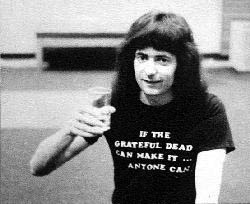 I: That's why you choose a song like "Since you been gone"?
I: That's why you choose a song like "Since you been gone"?RB: In a matter, yes. I heard a tape and thought: Hey, that's a good popsong. I wanted to record it right away. I thought it should be good to do something else. I think it was excellent for a single, I was lookin' quite some time for a good single. With "Long live rock'n'roll" we also had a good single. I: That brings the number of singles, you play live, to four. RB: You're right. I: What give you the idea for "Temple of the king", musically? RB: Good question. On American TV there was a yoga-program and the melody was quite nice. It was something like... (sings it)... I just changed it a bit. I: And how about "Mistreated"? RB: That was inspired on a old B.B.King song. The theme was this... (sings again)... It was in my head for a long time but I couldn't use it in Purple, then Coverdale came and his voice was alright for it. I: David claimed last year that he wrote that song before he joined Purple and you only wrote the instrumental midpiece. Ronnie Dio told us two years ago that David only wrote the lyrics. What's the real story? RB: Did David really told that? I didn't expect him anything else of him. He behaves like a little kid and start telling fairy tales. I just told you how I got the idea and if you don't believe me then that's your problem. I: I have here an interview (written by Bart Hekkelman in Dutch magazine ROCKSCENE) with Coverdale and he claims he wrote twelve different version of "Burn" and you choose the science-fiction-version. RB: Are you serious? This is just too much. I like to have that on black and white. If I get a chance to speak to him during the English tour, then he'll have another thing coming. I really get annoyed of all the rubbish he's telling around. I: Why did Ronnie left the group? RB: Well, Ronnie didn't left Rainbow, Rainbow left Ronnie. (silence) Then Bart Hekkelman turns up disturbing our conversation, he has finished the interview with Don. Then he asks Ritchie (disaster) who wrote "Mistreated".  RB: Are you talkin' German?
RB: Are you talkin' German? BH: No. RB: Santa Claus wrote the song. I: How did Don got into the group? RB: (lookin' serious) Oh, he's in this group? No, I don't know where he's from. He just dropped in. Cozy got him because we needed a keyboardplayer. He's not really a member. He's just a companion. He's not one of us. This is not getting anywhere. Ritchie's don't give serious answers anymore. We talk a little bit more. Then the bar closes, and we still keep talking in the dark. We know it's Ritchie Blackmore who's talking while it's pitch black, still we don't see him. In the end we shake his hand telling we hope to talk with him again in the future. While Ritchie leaves for the Disco-bar, we leave the Rotterdam-Hilton to finally get some sleep. RAINBOW IN KERKRADE 3-2-80 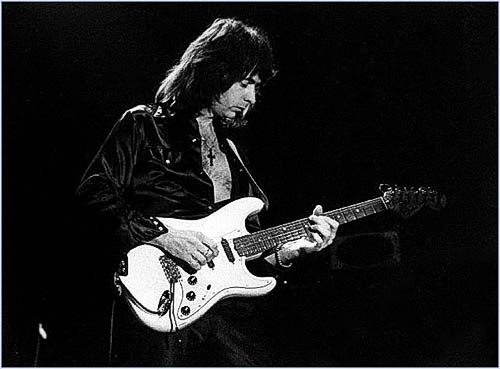 Sunday 3 February. We go to the Roda-hal, which is an ordinary sports hall. We notice a lot less speakers in the hall, which is only half the size of the Ahoy Hall the night before. The place is packed and everything looks alright for a good concert. The support act Katchis makes clear the sound is very good tonight. The audience is very positive and the band plays a song extra than in Brussels and Rotterdam.
Sunday 3 February. We go to the Roda-hal, which is an ordinary sports hall. We notice a lot less speakers in the hall, which is only half the size of the Ahoy Hall the night before. The place is packed and everything looks alright for a good concert. The support act Katchis makes clear the sound is very good tonight. The audience is very positive and the band plays a song extra than in Brussels and Rotterdam. In the pause we hear again the same tape. Also rainbow plays more of less the same set than the nights before. Ritchie plays this night first "All night long" and then "Since you been gone". The sound is excellent, so what can go wrong. But than it happens. After "Lost in Hollywood" it's again right away Judy Garlands voice. Roger told me last night that it was Ritchie's joke in Ahoy to test the audience to play the tape right after the last song of the set, but this time we get also the tape with "Weiss Heim" and I'm almost sure that we don't get an encore tonight. The crowd was full of enthusiasm but there's no encore. Why Ritchie? Why no encore? Isn't this a bit of theft, let the people pay 20 guilders for a ticket and then send them home after only 70 minutes? We know Ritchie sees an encore as an extra, while many people think an encore should be part of the show. We'll never find out why. Even a short encore can mean a lot. Beside this show was the best of the three this weekend. Ritchie just like to shock people, do exactly something else than people expect of him. THE MAN IN (THE) BLACK part 2 In "Over the rainbow en zo" number 2 we printed part one of this interview with Ritchie Blackmore. This is part 2 of this story according to Ritchie Blackmore the best that is ever written about him. Rainbow's albums, Deep Purple, Ronnie Dio, rock and roll and even Life itself all come under the hammer as Ritchie Blackmore gives his frankest-ever interview to SYLVIE SIMMONS in Los Angeles NO MATTER what he does", Ronnie Dio once said of Blackmore, "Ritchie always comes out all right. If he fell into a vat of shit he'd turn out to be wearing a rubber suit." That's how an interview started, titled "THE MAN IN (THE) BLACK". It was published in Sounds (15.12.79). If you want to read the original interview with The Man in Black, then click here GOODBYE OZZY, HELLO RONNIE There's been a split in Black Sabbath, Steve Gett talks to both sides of what's left. He talks with Tony Iommi, Ronnie James Dio and Ozzy Osbourne. "The recording of the new album will take about six weeks. That's a lot faster than in the past. As soon as we got together, we started working. Geezer always wrote all the lyrics, but this time Ronnie did it because he knows exactly how he wants to sing them. It all went a lot faster." Black Sabbath-guitarplayer Tony Iommi consider former Rainbow singer Ronnie Dio. It's obvious there's a lot more enthusiasm lately. It'll be real exciting when the group will start touring England in April, the first tour since two years. Iommi is optimistic: "A lot of people I spoke were excited that Ronnie is in the band now and they can't wait to see us play live." Ozzy was an important part of the (disputable) finest heavy metal group of the 70's and has a fanatic crowd when they play live, while the counterparts were glad because they thought this was 'the final curtain', not counting on the fact that the left trio, Iommi, Butler en Ward had something up there sleeve. 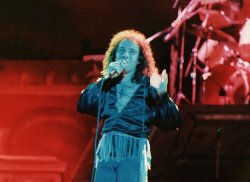 "It was, I think, June last year when I first met the Sabs," remembers Dio. "The band was in California, when they split up with Ozzy. I just started a solo project then and I left Connecticut for L.A. as I was lookin' for some musicians."
"It was, I think, June last year when I first met the Sabs," remembers Dio. "The band was in California, when they split up with Ozzy. I just started a solo project then and I left Connecticut for L.A. as I was lookin' for some musicians."Tony continues: "We met Ronnie on a party in L.A. and invited him to have some fun. We were not yet lookin' for a new singer, but we liked the way he was working. We had found each other and it was logical we should continue working with him." There were plans for a farewell tour with Ozzy -six weeks of touring was already arranged- but it didn't take place. While the tour schedule was being made it became clear it all was a waste of time. Both parties agreed that it was "the right time to say goodbye." A few months later Sabbath left, with Dio, for the Criteria Studios in Miami, where they already had been in the past. Iommi thinks it's a excellent and refreshing environment to record a new album. Together with the moving to Florida there also was the arrival of Rainbow en Purple producer Martin Birch. The annexation of Dio and Birch were not disjointedly. "The Sabs are special people and they expect in the studio a certain treatment," says Ronnie. "I think Martin is one of the easiest people to work with because he can et so close to the band. He's not the person who shows up, puts an idea on the table and then leaves for the control room to have a big cigar. He's very dedicated and works like he's the fifth member of the band." Ofcourse Martin won't go with them on tour to join the band; Ronnie does, to lead the band. The new singer want to point: "I am not a replacement for Ozzy. It reminds you of the early days of Rainbow. There were a lot of people that saw the group as a little Deep Purple and start shouting for songs like "Lazy" and "Smoke on the water". But it didn't took long before people saw Rainbow as a whole new group. I'm sure there'll be people who start asking for old Sabbath songs but I hope, preferably soon, they'll show up for the new repertoire." The group is impatient to play material from the new "HEAVEN AND HELL" album, but they'll also play the old songs. "We won't do songs like "Iron man" and "Paranoid", Ronnie continues, "because there's a too big identification with Ozzy in those songs. But we will play songs from the past, possible songs the band never played live before but are favorites with the fans, like "Sabbath Bloody Sabbath". There's been a lot of comments that the group should change their name after Ozzy's departure. Toni: "We never thought about changing the name when three members still are in the band. Why should we change the name?" 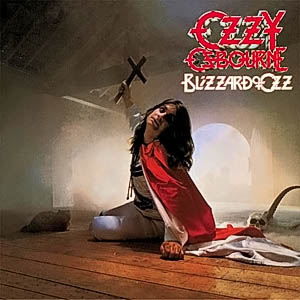 "I'm glad the band kept their name", says Ronnie. We try to do not too many changes but try to keep the essence of Black Sabbath as a rock'n'roll band high. It also should have been a bit more difficult to start all over again with a new name and it's easier to step in on a higher position."
"I'm glad the band kept their name", says Ronnie. We try to do not too many changes but try to keep the essence of Black Sabbath as a rock'n'roll band high. It also should have been a bit more difficult to start all over again with a new name and it's easier to step in on a higher position."Ozzy: "I just got a new band together. It's the same intent as Sabbath: guitar, drums, bass and vocals. I've got BOB DAISLEY on bass, he played before in Widowmaker and Rainbow. For the rest I got a new, unknown guitarplayer Randy Rhoads, who I met in the studio. On a certain moment I already had a deal with Gary Moore, but he wanted his way and I wanted my own way, so we both went our own way. I had to change something, so when I came back from the States I took Randy with me. He's very wild, a young Ritchie Blackmore, that's the best way I can describe him." Ozzy's (on the moment of this article) still nameless group has recorded a debut album in the studio. It'll be released before summer. To come up with a name for the band gives Oz problems. "How do you call a band after Black Sabbath? There are rumours that I would name the band Son of Sabbath but that's bullshit." Ozzy is happy with his new band and will play England in May or June. They'll certainly will play some old Sabbath-songs like "Paranoid". But what will be the name of the band? Melody Maker - 22 March 1980 RAINBOW IN ENGLAND After the tour on the European Continent rainbow toured England. Not everything went as planned. Read on about Ritchie caused some trouble (it wasn't the first and it won't be last time)..... All night long? You must be joking.... RAINBOW UPRISING AS BLACKMORE THROWS A MOODY (again) Rainbow's Wembley Arena-concert last week ended with a mess when the band refused to do an encore. The band did their set, which took about 70 minutes, but despite the shouting audience the group didn't return on stage. A few minutes later the lights in the hall went on and that meant the show was over. The audience start throwing scarfs, programs and chairs on the stage. The London Arena had to be evacuate by the police; result ten arrests. The damage was over 10.000 pound, including destruction of doors, equipment and chairs. Rainbow-publicist Jennie Halsall told: "There was no reason at all for the things that happened. If you want to hear a reason: Ritchie went to the bog, and when he returned, the public already left the place. Blackmore's moodyness is well known and it turned out he just do not wanted to do an encore. This statement is more likely after he explained the following night (when he played the same hall): "I was playing excellent but the audience didn't appreciate it." The press thinks the rest of the band was willing to do an encore. There were rumours the encores would be a Deep Purple reunion with Ian Gillan as the singer but there was no sign of any Deep Purple member, except for Blackmore and Glover. After many people worked all night to repair the damage, the next show on Saturday took place without problems and including an encore. Another thing was new wave/hard rockband SAMSON, who did the support act. On Friday night they did an encore. It's ironic, the support act does an encore while the headliners leave it. When Samson arrived on Sunday night in Leicester, they bumped into another group, Katchis (who supported Rainbow on the Continent), they were setting up their gear. Samson was told, they were no longer needed for the Rainbow-tour. Sounds, 8 March '80 Also Melody Maker wrote a short review. Rainbow's 'no encore' riot 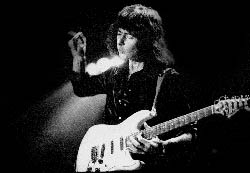 Rainbow's first concert in the big Wembley Arena in London on Friday 29 February ended in a big destroying, with a result of 10.000 Pound damage and a fight behind the scene between Ritchie Blackmore and the rest of the band. It was Blackmore's decision not to do an encore.
Rainbow's first concert in the big Wembley Arena in London on Friday 29 February ended in a big destroying, with a result of 10.000 Pound damage and a fight behind the scene between Ritchie Blackmore and the rest of the band. It was Blackmore's decision not to do an encore.This resulted in a act of violence, that ended with ten arrests and a huge bill for 500 chairs and other damages caused by the furious, shortly before that so enthusiastic, public. The fans demonstrated their frustration, while Blackmore left the rest of the band frustrated as they wanted to do an encore. Blackmore refused to change his decision. The next night Rainbow played Wembley again, did an encore and everything was fine. CAUGHT IN THE ACT: RAINBOW, WEMBLEY ARENA 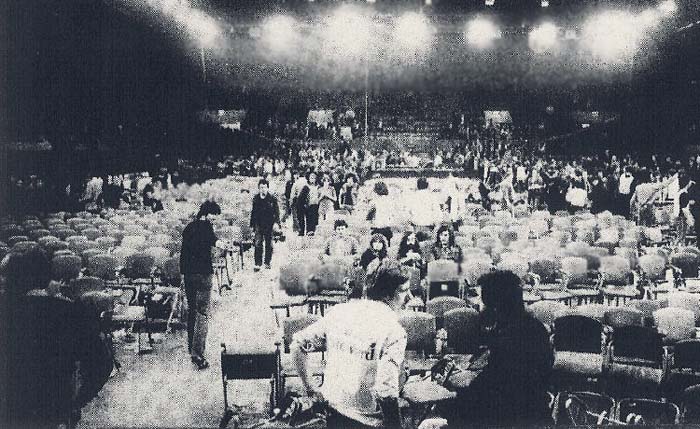 LONG LIVE ROCK AND ROLL (but only for 70 minutes): the aftermath of the Rainbow gig at Wembley The law of the show business has always been "the show must go on". And long enough to give fans the feeling that those 4 or 5 quid (and bought merchandise and possibly travelled a distance) their spendings were not without effort. No entertainer, how much talent he's gifted with, should ever forget this. I'm talking here specific about what happened last Friday night in Wembley, when Blackmore treated his audience a cold shower. The 70-minutes-set was finished and Rainbow left the stage. The ecstatic audience was begging for an encore. But whatever happened, Rainbow never returned to the stage. The lights went on and promotor Paul Loasby told the fans "it's time to go home". The atmosphere was more than only a disappointment and the crowd started throwing chair to the stage. The rest of the band also was as furious as they wanted to do an encore. But nothing could change the situation. Ritchie refuse to play one and that was it. Blackmore is without a doubt one of the most liveliest people in the rockbiz, who does exactly those things that are not expected, but last Friday he took the limit. Why decided Blackmore to do this? It won't harm him -at least this time, cause the fans will keep on buying the records and see the band play live, forgetting about this treatment. One way or the other Blackmore needs punished for the way he does things like this -and gets away with it. Ironically the concert was a big success until the accident. From the start when Rainbow begun with "Eyes of the world" the audience went wild. Cheering from start to end with the show which was concentrated around the "Down to earth" album. "Since you been gone" gave an excellent response, just like "Man on the silver mountain" and "Catch the rainbow", two classics from the past. Don Airey gave a great keyboard-intro to "Lost in Hollywood", which also had solos by Ritchie, Cozy and again Don. "Animal" Cozy's solo was like magic. Blackmore might think his act was justified, but his fans have been faith full to him for years and they deserved more than they got. Steve Gett, MM, 8th March RAINBOW and the Press Hard-rock hardly ever get positive reviews (certainly not in the daily newspapers), still Rainbow didn't do too bad in the reviews for the concert in The Hague 1977. This time the concert in Ahoy Rotterdam got almost only negative reviews. We have to consider that reporters of daily newspapers hardly know the bands they have to visit. They have to go to many concerts and if they have to go and see a band they don't like you can expect weird reviews. CONCERT RAINBOW WAS FLOATING ON INDOLENCE At the concerts of the Irish new-wave-group Boomtown Rats and the English hard-rock-group Rainbow it became clear how the audience can influence the night. ....(firstly there's a review of the Rats-concert which had a small audience that didn't go wild, while the band was trying hard but later played on without any self-confidence)... It's a total different story for Rainbow in Ahoy. There wasn't a note played and the crowd of 7000 made an excellent atmosphere. Rainbow, lead by guitarplayer Ritchie Blackmore and singer (!) Roger Glover (both played once in Deep Purple) didn't got inspired by the enthusiastic audience. They played on routine, almost easy going, their cumbersome hard-rock, tasteless decorated with themes of classical music. Only for the real fans this is interesting, others will fall asleep or leave the place early, it's pathetic what this group brings. Ton Olde Monninkhof, AD 4th February 1980 Comment: We think this figure indeed fell asleep or left early cause he didn't got the picture at all. POOR RAINBOW 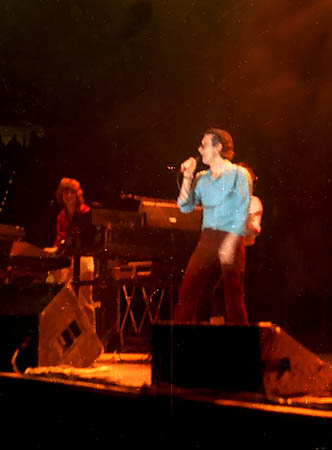 There are so many new bands these days we almost forgot there's also something as hard-rock that is as popular as ever for the real fans. Saturday night Rainbow played a sold out Ahoy in Rotterdam. Despite of all the cliches the group showed, the audience went wild so it was a success on forehand.
There are so many new bands these days we almost forgot there's also something as hard-rock that is as popular as ever for the real fans. Saturday night Rainbow played a sold out Ahoy in Rotterdam. Despite of all the cliches the group showed, the audience went wild so it was a success on forehand.Rainbow is set up in 1975 by guitarplayer Ritchie Blackmore. He was the super guitarplayer in Deep Purple, that wanted to something less heavy at the time. Blackmore wanted to keep the old Deep Purple-style. Especially of it's commercial successful formula. So the starting-points of Rainbow were guarantee for a total lack of musical development. The sound of the band during this concert was extremely opaque. It all was a big resonance in which we could only discern Blackmore's guitar and the forced voice of singer Graham Bonnet. The moderate compositions were played ridiculous long with uninteresting solos. It's clear that Rainbow artistically don't live anymore, especially when you notice all the activities outside the band. Drummer Cozy Powell has formed his own group already with Jack Bruce and guitarplayer Clem Clemson. But as long as the audience shows a forced affection for Rainbow, they will pump everything out of it. Geert Kistemaker, Volkskrant, 4-2-80 Comment: The Deep Purple-line probably was a commercial success formula, for Blackmore Rainbow has been a big step back financially for years. It took him five years before Rainbow got the popularity which reminds you of Deep Purple. Reviewer Geert points to the activities of members outside Rainbow. He names Cozy. We don't know anyone else on the moment. Besides that recording a solo album is not the same as starting a new group. LOAFERNESS AND LOADS DISPENSABLE Hardrock-public is a strange kinda people, not too bright, that feels best in the underdog position. There's nothing going on in their world for years now. This is their life, and for those who feel comfortable in that world it's a relief it goes this way. For the future of the popmusic it doesn't matter if we would bury the whole thing. But for the fans it's almost a religion, like soccer. Concerts are like wild parties with too much beer and loads of tasteless merchandise. Meeting-point this Saturday night was the Ahoy Hall where it was Ritchie Blackmore's group Rainbow who did a show. It's a miracle that Rainbow almost sold-out the place. Maybe it's because the last time they played Holland is already two years ago and the fact there are not that many hardrock concerts lately. 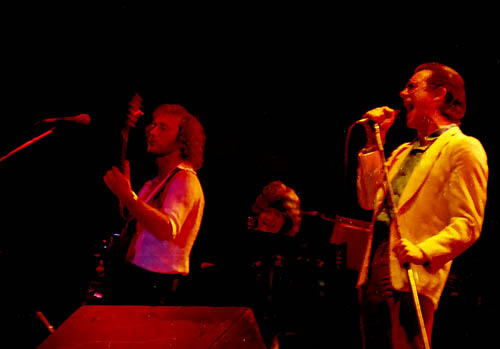 Blackmore once guitarplayer in Deep Purple, is for the denim dressed audience a legend, and he can claim the legacy of that band. Blackmore is known to be a difficult person.
Blackmore once guitarplayer in Deep Purple, is for the denim dressed audience a legend, and he can claim the legacy of that band. Blackmore is known to be a difficult person.The now almost 35 years old star has fired so many members that nowadays he himself is the only member left from the original line-up of Rainbow. These days the group is bassplayer Roger Glover, also a former Deep Purple-member, drummer Cozy Powell, keyboardplayer Don Airey and singer Graham Bonnet. According to insiders their diversity of musical backgrounds made this the strongest line-up, Rainbow has ever had, that means, it's unbelievable but there were times it must have been even worse than this. From the last Rainbow show it became clear the band was in a dead end. They are now moving there in circles. The concert last Saturday showed loads of loaferness and dispensables. Especially Blackmore has a big, almost classical presumption, which ends up in a poor melt together of standard-hardrock with loud electronic sound impressions and baroque variations on themes like Greensleeves, Somewhere over the rainbow, Close encounters & Alle Menschen werden Brüder. We got older songs like Catch the rainbow, but it was mainly songs from the last album Down to earth. Graham Bonnet was singing his voice to pieces on one liner repertoire like All night long. In ended in long solos and went out like a candle in the night. The audience loved every minute of it. And went totally crazy when Blackmore smashed his guitar in pieces on one of the speakersets in the encore Long live rock'n'roll. Unfortunately it all was fake. Peter Koops, NRC. 4th February 1980 FAMILIAR SOUND AT RAINBOW 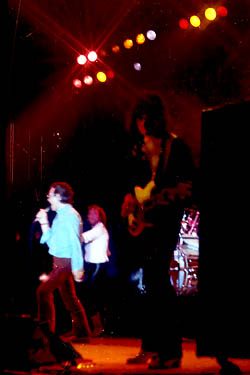 And then Ritchie Blackmore smashed his guitar into pieces. For those of the 7500 in Ahoy who didn't see it, it was not an expensive Fender Stratocaster of the star, guitarplayer of Rainbow. Only the same type of a cheap brand that just looked like it.
And then Ritchie Blackmore smashed his guitar into pieces. For those of the 7500 in Ahoy who didn't see it, it was not an expensive Fender Stratocaster of the star, guitarplayer of Rainbow. Only the same type of a cheap brand that just looked like it.That cheaper approach was the only big difference to the show of this post-Deep Purple-group four years ago in the Hague. That time clownish Ritchie destroyed his expensive Fender in the last encore. The presentation and music were good. Edward Elgar's "Pump and circumstance", the childish voice of Judy Garland from "The Wizard of Oz", a magnesium bomb, a huge backdrop, in a word everything was present. The band their selves also were great. Graham Bonnet shouted his lungs out, Don Airey (keyboards) and Cozy Powell (drums) didn't put all their energy in their solos. With all this enthusiasm only bassplayer Roger Glover ("Love is all") was a bit out of place. Ritchie Blackmore himself looked a bit more shy than the years before. Then the music. On a normal soundlevel it's nice to listen to, anyway there's nothing new under the rainbow. The songs from the last album "Down to earth" are very nice to hear ("All night long" is released as the next single one of these days). They sound like you think you've heard them already before. With Deep Purple, the former group of both Blackmore and Glover. Who didn't get too bored with that idea can have a lot of pleasure from this Rainbow. Louis du Moulin, Het Vrije Volk, 4-2-80 RECORDTALK BLACK SABBATH "HEAVEN AND HELL" Early summer 1970. Very enthusiastic about the just released "Deep Purple In Rock", I also discover another group with a striking sound; Black Sabbath with their single "Evil woman". The record brings me to the first album called "Black Sabbath", ten years later still a monument in the world of hard-rock. Shortly after that a second album "Paranoid" is released. A record, I soon don't like at all because of the too much repeated typical heavy Sabbath banging sound. I'm also not impressed by "Master of reality" and "Volume 4". So I lost interest in the band completely. 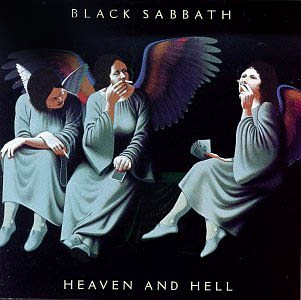 Early summer 1980. Ten years later and I'm faced with Black Sabbath again because Ronnie James Dio has switched from Rainbow to Sabbath. This occasion brings us the album "HEAVEN AND HELL". The first time listening makes clear that with the departure of singer Ozzy Osbourne also the recognizability of Sabbath is gone. You should think that not only is the singer is replaced.
Early summer 1980. Ten years later and I'm faced with Black Sabbath again because Ronnie James Dio has switched from Rainbow to Sabbath. This occasion brings us the album "HEAVEN AND HELL". The first time listening makes clear that with the departure of singer Ozzy Osbourne also the recognizability of Sabbath is gone. You should think that not only is the singer is replaced.The group sounds very fresh for a band that's already ten years busy. Eight tracks are on this album, all compositions written by the whole band. "Neon Knights" (single?) opens loud and swings. "Children of the Sea" follows, opened with acoustic guitar, accompanying Ronnie's voice, but then we hear the known Sabbath bashing sound. "Lady Evil" is a bit more speedy, could have a chance like "Neon Knights" to be a (hit)single. The titlesong ends side A. The first part we get the Sabs bashing sound, but Ronnie his voice fits in better here. The slow rhythm get faster with the solo by Tony accompanied by drummer Bill Ward and bassman Geezer Butler. The tempo is turned up, and gets with the contribution of Dio a great climax, and then the songs ends acoustically. "Wishing well" is the opener of side B and reminds me of Rainbow. Ronnie even sings "Then, think of a rainbow and I'll make it come real." "Die young" is for me one of the highlights of the album. We hear Ronnie like in "A Light In The Black" and the others in the band drive the tempo up, with a nice restpoint in the middle of the song. "Walk Away" is a weak song. But then we get another excellent track to end this album: "Lonely Is The Word". A great ballad, I think Ronnie was musically also responsible for most of this track, we hear brilliant synthesizer parts like in "Catch The Rainbow" at the end. In this song Tony Iommi plays one of his best solos in his whole career. Black Sabbath, many thought they were dead already, has risen from the grave. It's obvious Ronnie will bring the band to new heights. I hope soon to be able to tell you how they're live. WILD HORSES Wild Horses is a new name in the hard-rock. This four-piece is formed by ex-Rainbow-bassplayer Jimmy Bain and ex-Thin Lizzy-guitarplayer Brian Robertson. In this new group they also both sing. On this moment their album will be released (we'll get back to that in the next issue), but on the moment of writing we just got our hands on their first two (not released overhere) singles we got outta England. CRIMINAL TENDENCIES / THE RAPIST
EMI INT 599  The a-side is a song, you best can describe as 'easy going hard-rock'. It has a striking Supertramp-like piano that float thru the whole song. "The Rapist" is a wild hardrock song. Fine debut single by Wild Horses, released at the end of last year in England. FACE DOWN / DEALER EMI 5O47 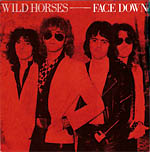 The a-side of the second single of this group has the typical guitarsound of Brian Robertson, like you can hear on the records of Thin Lizzy, where he's on. Just like "Criminal Tendencies" this is also a song you're remembering once you heard it. "Dealer" is not that good. Both singles are produced by Jimmy Bain, Brian Robertson and no one else than Trevor Rabin. The singles are making us curious for the debut album, which will be called "Wild Horses" and will be released in England on EMI EMC 3326. © Rainbow Fanclan 1979-1984
|